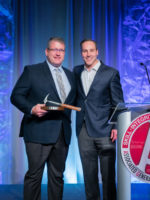AGC of Utah 2014 Convention Recap
The 92nd annual meeting of the Utah Chapter of the Associated General Contractors of America opened in Salt Lake City Jan. 23 with the theme of “Building Knowledge.”


But “building optimism” could have been just as appropriate, with a positive buzz among attendees about work backlogs and a forecast by state economists for continued slow but steady growth in 2014.
During the opening luncheon on Jan. 23, attendees heard from a panel of economic experts. Repeating the format from last year’s convention, speakers included Natali Gochnour, chief economist and senior adviser to the Salt Lake City Chamber of Commerce; Jeff Edwards, president and CEO for the Economic Development Corp. of Utah; and Spencer Eccles, executive director for the Governor’s Office of Economic Development.
Gochnour noted that after previous years of growth in single and multifamily housing, the numbers of new permits has leveled off but the value of permits issued statewide has remained high.
“There is opportunity out there, and things are feeling better, but maybe not quite where it ought to be yet,” Gochnour told AGC members and guests. “I love our state’s fiscal discipline, and you can be assured the state and local governments are being smart with your money.”
Gochnour expressed less confidence in the federal government saying it is “paralysis and partisan fighting” in Washington D.C. that have kept the economy from being better than it is.
“I think 2014 will be better than 2013, and things are lined up for this economy to take some big steps, but I’m worried about the Feds continuing to argue about the debt ceiling and more dumb cuts like the sequestration instead of smart cuts,” she said.
Edwards reviewed the success of several recent large construction projects and current projects that will increase jobs in the state, including new manufacturing plants for Petzl mountaineering equipment and Ottobock, a maker of artificial and robotic limbs.
He noted issues related to quality of life are important to companies considering moving their operations to Utah, and the continuing poor air quality along the Wasatch Front (often among the worst in the nation during the winter months according to monitors at the Environmental Protection Agency), is having an impact.
“It is time to stop making excuses for this. Our geography is what it is, but we need to see what we can do to clean our air,” he said.
He encouraged AGC members to give input to policymakers regarding what the industry can reasonably do to cut vehicle emissions, make buildings more energy efficient as well as purchase newer, more-efficient fleet vehicles or convert vehicles to run on natural gas when possible.
Eccles issued a call to AGC members to become involved in the current efforts of Envision Utah, a group of leaders from business, government and communities crafting recommendations for long-term development around the state.
“Just over 20 years ago, Envision Utah got together with government leaders to help plan for the future,” Eccles said. “Much of the work many of you have had the benefit of doing for the past 10 years is the result of that planning. We are now embarking on a new plan. There is never a convenient time for public service. We need you involved in this process.”
Like other speakers, Eccles praised the state’s diverse economy and was cautiously optimistic about the coming year.
“We have the fourth most diverse economy in the nation, and we are the second-fastest growing behind North Dakota, which is only being driven by energy production,” he said. “In the past three and four years, there has not been the same positive feeling and outlook about the opportunities we see out there today.”
A Focus on State Budgets
AGC of Utah President Rich Thorn says the organization’s members and lobbyists will be focusing their efforts on budget appropriations during the 2014 legislative session, which began Jan. 27, just after the convention. This year’s Utah state budget is expected to total around $13 billion, according to the State Auditor’s office.
“There is no talk of deficits this year like there has been in the past, so we are going to be working on appropriations at the UDOT and DFCM level,” Thorn says.




